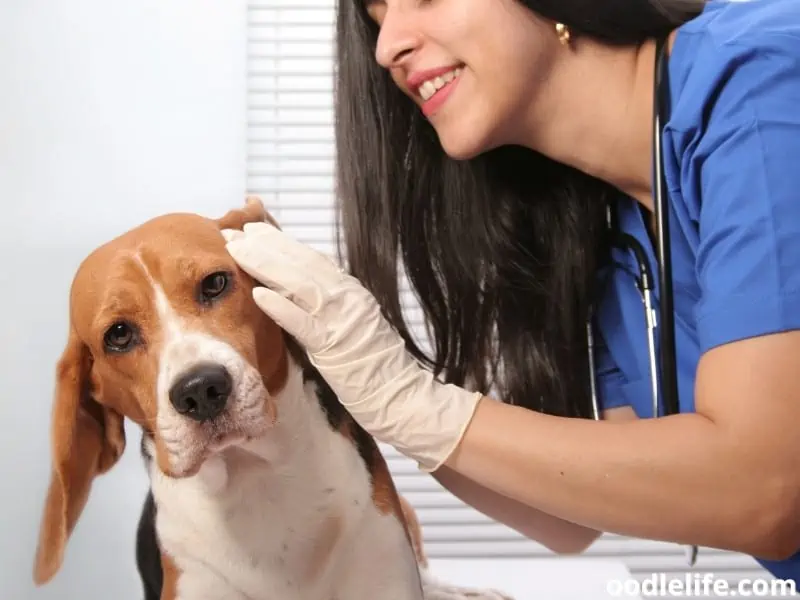My Dog Is Wobbly and Off Balance (Why?)
“My dog is wobbly and off balance: what should I do?” If your adult dog was healthy and acting perfectly normal before, but suddenly has trouble when walking and seems off balance, there could be many reasons for this.
However, if a puppy begins to walk and you notice that it has a wobbly walk and has always walked in an imbalanced way, this puppy may have cerebellar hypoplasia.

With that disclaimer out of the way, if your otherwise healthy adult dog suddenly begins to wobble, what could be the cause? Let’s discuss some of the most common causes of wobbliness and off-balance walking, standing, or sitting for dogs.
Signs of Loss of Balance
It is crucial to first distinguish loss of balance (wobbly standing or walking) from difficulty walking or standing. These two symptoms can lead to entirely different medical conclusions and needs.

Other signs that often accompany a loss of balance in dogs are as follows:
- Their eyes move back and forth uncontrollably.
- Their head tilts.
- Vomiting.
- The tendency to accidentally move in circles.
Before seeking out the following potential causes of why your dog is wobbly and off balance, determine whether that is the issue or whether your dog is having difficulty walking.
Potential Causes for Disequilibrium
Let’s examine common reasons your dog is wobbly and off balance. This symptom is referred to as disequilibrium and has causes ranging from very manageable to severe and dangerous.
Disequilibrium is more common in older dogs than in young ones, but that can also depend on the underlying cause.
Cerebellar Hypoplasia
As mentioned above, if you have a dog that has always been off balance, they may have a condition called cerebellar hypoplasia. This congenital condition affects the cerebellum, which is responsible for balance in the brain.

If a puppy has this condition, it is entirely possible and probable to deal with the condition and for the puppy to live a long and healthy life.
Concussion
Your dog may have simply had a minor head injury which has resulted in them losing balance. A concussion is an injury to the brain, not the skull bones. This injury can happen when an impact causes no harm to the skull but is strong enough to jostle the brain against the skull’s interior, causing bruising and/or swelling.

Most concussions are not serious and could have simply happened due to roughhousing with other dogs or a fall down the stairs. Dogs that have been struck by vehicles could also suffer concussions.
If your dog’s wobbliness is caused by a concussion, other accompanying symptoms could include the following:
- Drooling
- Loss of consciousness or confusion
- Bleeding from the nose or ears
- Dilated pupil(s)
- Vomiting or loss of bowel control
- Fatigue
- Change in appetite
The best thing to do is to take your dog to the vet for a professional assessment.
Ear Infection
Although some ear infections can get quite serious without proper treatment, most are treatable with special ear drops and go away within a few days or weeks. An ear infection is another possible cause of your dog being off balance, as the inner ear (along with the cerebellum) is partially responsible for balance.

Prevention is the best course of action when it comes to ear infections—dogs are more prone to getting ear infections than humans because of the shape of their ears.
However, despite your preventative efforts, your dog may still contract an ear infection. Some symptoms include crustiness and oozing from the ear, redness, swelling, and odor coming from the ear canal.
Your dog might have an ear infection from:
- Allergies
- Overcleaning
- Wax buildup
- An injury
- An autoimmune disease
Take your dog to the vet immediately because they can diagnose whether the ear infection is in the outer, middle, or inner ear (the latter is a likely cause of wobbliness).
Poisoning
One of the more serious explanations for why your dog is off balance could be because of poison. Although it’s illegal in most areas to put out food poisoned with antifreeze or arsenic to kill others’ pets or even for pest control, people still practice this.

It’s also possible your dog ate a plant during a walk or while roaming in the yard that would cause wobbliness, like oleander, hemlock, or lilies.
Accompanying symptoms of poisoning include:
- Vomiting
- Diarrhea
- Seizures
- Excessive drooling
- Loss of consciousness
- Shaking
- Agitation
Take your pet to the vet for emergency care immediately if you observe any combination of these symptoms in your dog.
A helpful tip is to always research which plants are safe for pets and which ones you should keep far from your yard and home.
Vestibular Disease
Also known as canine vestibular syndrome, your dog could be suffering from vestibular disease. Both young and old dogs can have some form of vestibular disease because it comes from anything that affects the vestibular system, like ear infections or illnesses.

The vestibular system is located in your dog’s inner ear and helps them with motor functionality and stability. It also aids in helping your dog with spatial awareness and balance.
There are several different forms of canine vestibular syndrome, and in some, the symptoms may only last for a few days, depending on the cause.
This short-term version is more likely to have an external cause and affect younger dogs. Older dogs are often diagnosed with idiopathic vestibular syndrome, which can be managed but can also show up again and cause lasting effects, such as nausea or head tilting.
Other symptoms besides wobbling include:
- Head tilting
- Heavy panting
- Irregular eye movements
This disease can be managed, and your dog may have no lasting effects, especially in young dogs. However, it is more likely that your dog will retain some kind of small balance issue or another symptom even after the initial flareup of vestibular disease has retreated.
Until your dog recovers from the major symptoms of canine vestibular syndrome, it’s best to remove all obstacles from their path. You should give them plenty of time to rest and easy access to water and food. If you have stairs in your home, keep your dog on the lower floor so they cannot injure themselves.
Tumor
Your dog could be wobbling when walking or standing because of a tumor. This possibility is not as common a cause of wobbliness as the previous items on our list, but it is a concern if the others don’t seem likely.

Tumors in your dog’s brain or brainstem can cause them to develop vestibular system issues and lose their balance.
If your dog has a brain tumor, other symptoms may include neck pain, extreme sensitivity to touch on their heads or necks, dizziness, head tilting, personality changes, walking in circles, and vision issues.
If you suspect your dog’s off-balance gait is due to a tumor, don’t waste any time taking your furry friend to the vet to diagnose the issue. It may not be a tumor, but if it is, it also may be treatable, and your dog can continue living a happy, healthy life.
Stroke
One other relatively common reason your dog could be wobbly is that they had a stroke. Strokes have many symptoms in common with some other conditions we’ve mentioned, like tumors, poisoning, and concussion. But one thing unique to a dog stroke is weakness on one side.

Other stroke symptoms include uncontrolled eye movements, head tilting, seizures, nausea, walking in circles, and limping.
A stroke is oxygen deprivation to the brain and usually only affects one side of the brain at a time. This condition manifests outwardly, and you may see your dog unable to control just one side of their body.
You may not be able to catch a stroke while it is happening (they can happen quickly), but if you notice any of these symptoms, take your dog to the vet immediately.
Final Thoughts
We love our furry friends and do not want them to suffer injuries or illnesses, but life isn’t always predictable.
Some of the reasons your dog could be wobbling are much easier to diagnose and cure than others, but most are manageable.
If your dog is wobbly and off balance, they may just need a vet assessment and some medication to recover. However, there are also a handful of serious conditions to watch out for, such as a tumor or stroke.